
Why meditation is a good idea
The world is getting louder. Already in the morning, even before the first coffee is on the table, stimuli flow on us: messages, emails, appointments. Our everyday life is piled up, our thoughts rarely still quietly. There is hardly any room for one: pause between all of this, react and do it. And yet many people long for after a moment of calm. After a clear head, a relaxed body, a feeling of inner balance. Some are looking for relief in sports, others in nature, others in conversations. But a method that is often underestimated in its simplicity is becoming increasingly important: meditation. In this article you will learn why it is worth mediting regularly, what proven health effects have meditation - and how you can easily integrate them into your everyday life.
What is meditation?
Meditation is an exercise for the mind. They have been doing people for thousands of years - in many cultures and religions. The main thing is to deliberately draw your own attention. For example, you watch your breath or thoughts without losing yourself. Those who meditate regularly can change their thinking, feeling and perception positively. Meditation helps many people to become calmer, more relaxed and clearer. Science also confirms today: Meditation acts - on the brain, feelings, the immune system and even genes. Meditation is an important part in religions such as Buddhism and Hinduism, but also in Christianity or Confucianism. Today, however, many people also use them independently of religion - simply to feel better. What was once considered a spiritual practice is researched worldwide today and used therapeutically. Not as an escape from everyday life - but as a tool to meet him with more serenity.
Meditation in research
Meditation has been practiced in many cultures for a very long time. But only since the 1970s started to take a closer look. You wanted to know: How does meditation actually affect our mind and our body? Especially since the 1990s, the topic in research has become increasingly important. It is not about faith, but about verifiable results. Researchers from various areas - for example from psychology, medicine or brain research - examine what happens in the body and brain when meditating. You use many different measuring methods for this.
For example:
- Brain scans to see which parts of the brain are active during meditation
- Tests to examine thinking, feeling and behavior
- Interviews with meditators
- Blood or tissue samples to measure changes at the cell level
Earlier studies were often still inaccurate, for example because they mixed different types of meditation or had no comparison groups. Research is better planned today. For example, make sure that the type of meditation is examined and compares the results with control groups that do not meditate.
So what does meditation do in the body?
The condition of the body changes when meditating. Many physical processes switch to "relaxation".
For example, this shows:
- The blood pressure drops
- The oxygen consumption decreases
- The skin leads less electricity - a sign of lower tension
The stress hormone cortisol, which is released in the body in the event of pressure and stress, also significantly drops after meditations. Less cortisol means: less stress, calmer thoughts and a more relaxed nervous system. Meditation even works into our genes. In intensive meditations, it shows that certain genes that are related to inflammation in the body are less active. This then affects genes that ensure that inflammatory substances are formed. Certain enzymes that increase inflammatory reactions are less manufactured. Regular meditation also protects our telomeres. These are the protective caps at the ends of our genetic information (DNA). Short telomeres stand for biological aging and a higher risk of illness. In people who meditate, these telomeres remain longer - so they may age more slowly. So -called epigenetic markers, which show how healthy or old our body is organic, are also positively influenced by meditation. Das nennen Forschende eine „Verlangsamung der epigenetischen Uhr“
What does meditation do in the mind?
Not only the body changes. Our thoughts, feelings and perception are also influenced by meditation.
This is shown by research:
- We perceive what happens in and around us.
- We can control our attention better.
- We react less to stressful feelings.
- Our thoughts become more flexible.
- The memory improves.
- The concentration increases.
After a few weeks of meditation practice, these effects can be measured. Dealing with themselves also changes: people feel more self -effective, go around with themselves and feel more in terms of life. A special form, the so-called "loving childhood meditation" (in German: meditation of the loving sympathy), even leads to more positive feelings. Anyone who meditates regularly can also recognize that thoughts and feelings are only temporary. You perceive them without completely identifying yourself. This helps not to lose yourself so much in worries or brooding. This ability is called decentralization in technical terms - it also plays an important role in psychotherapy.
What happens in the brain?
Our brain is very adaptable - especially if we practice new things regularly. This also applies to meditation. This makes certain brain areas stronger. This includes the prefrontal cortex, responsible for planning and self -control, the hippocampus, important for memory, and the insula, involved in body feeling and compassion. A brain network that is very often examined is the so -called default fashion network
(In German: "Land Network"). It is particularly active if we are not focused on external tasks - for example when pondering, daydreaming or when we think about ourselves. Meditation often means that this network is less active. That means: less brooding, more attention in the here and now, less self -relation. The Amygdala, an area that has to do with fear and stress, also appear in meditating changes. Some studies even showed that in experienced monks, the synchronization of the so -called gamma hells in the brain was particularly strong - a sign of intensive concentration and alertness.
How does meditation affect general health?
Previous studies were sometimes inaccurate, but many recent studies show that meditation can have a positive effect on health.
Here are some examples:
• Blood pressure can drop
• People with heart failure report more quality of life
• Pain and migraines can become weaker
• Sleep problems can improve
• Meditation has been proven to help with depression
• Even in the event of feelings of fear, meditation has a positive effect
• Stress can be processed better
Meditation is often even more effective than pure relaxation techniques. The so -called mindfulness -based cognitive therapy (MBCT) is particularly well researched. It helps prevent relapses of depression and is therefore part of the official treatment recommendations.
Why meditation also makes sense for histamine intolerance
Meditation reduces stress - and less stress means less histamine. In the event of stress, the body releases the hormone cortisol that makes the nervous system on alert. The body activates the combat or escape mode, which means that all the non-survival functions-such as digestion, cell repair and detoxification-pause. The cells no longer absorb nutrients and do not emit waste products, which creates a toxic environment. In addition, neurotransmitters such as adrenaline and norepinephrine are released to sharpen the senses. The immune system is activated, which causes mast cells to release histamine. This continues to keep the body on alert, increase the pulse and widens the blood vessels - which in turn ensures even more stress. Too much histamine in the body also triggers stress. A vicious circle is created. If the body experiences this stress-histamine cycle permanently, the histamine symptoms can deteriorate or add more.
To read on stress and histamine, we already have a detailed contribution for you:
Stress Histamine trigger
Some concrete examples of meditation
It doesn't always have to be an hour of meditation. Even small exercises in between can make a difference in the long run. That's why we have a few examples for you here.
-
Sit still in the morning
After waking up, just sit on the bed or a chair for five minutes. The eyes can be open or closed. You don't have to do anything - just feel your breath and perceive how thoughts come and go. So you start the day calmly and collected. Also an idea: instead of drinking the tea on the side, take your time. Hold the cup in your hand, feel the warmth, smell the fragrance, taste consciously. This is also a small mindfulness exercise.
-
Meditative walking
After waking up, just sit on the bed or a chair for five minutes. The eyes can be open or closed. You don't have to do anything - just feel your breath and perceive how thoughts come and go. So you start the day calmly and collected. Also an idea: instead of drinking the tea on the side, take your time. Hold the cup in your hand, feel the warmth, smell the fragrance, taste consciously. This is also a small mindfulness exercise.
-
Short breathing break in between
When it gets hectic: snapshots aside, close your eyes, only inhale and exhale for two minutes. Choose up to four when inhaling up to four, up to six. This is how your nervous system calms down - almost like a restart. Do you want to get to know more breathing techniques? Then we have some specific instructions for you here: Stress meter technology
-
Sleeping aid through meditation
In bed you can come to rest by concentrating on your breath. Feel how the stomach rises and lowers. When thoughts come, take care of them and let them move on - like clouds in the sky.
-
Guided meditation via app or audio
Apps or online videos help to get started. There you will be guided through meditation - for example with a calming voice or gentle sounds. Particularly good if you are still unsure or can concentrate badly.
-
Fixed place in the daily routine
If you have the opportunity, look for a fixed time, e.g. B. always before breakfast or in the evening. Submit them in the calendar. Even three minutes a day make a difference - the regularity is important.
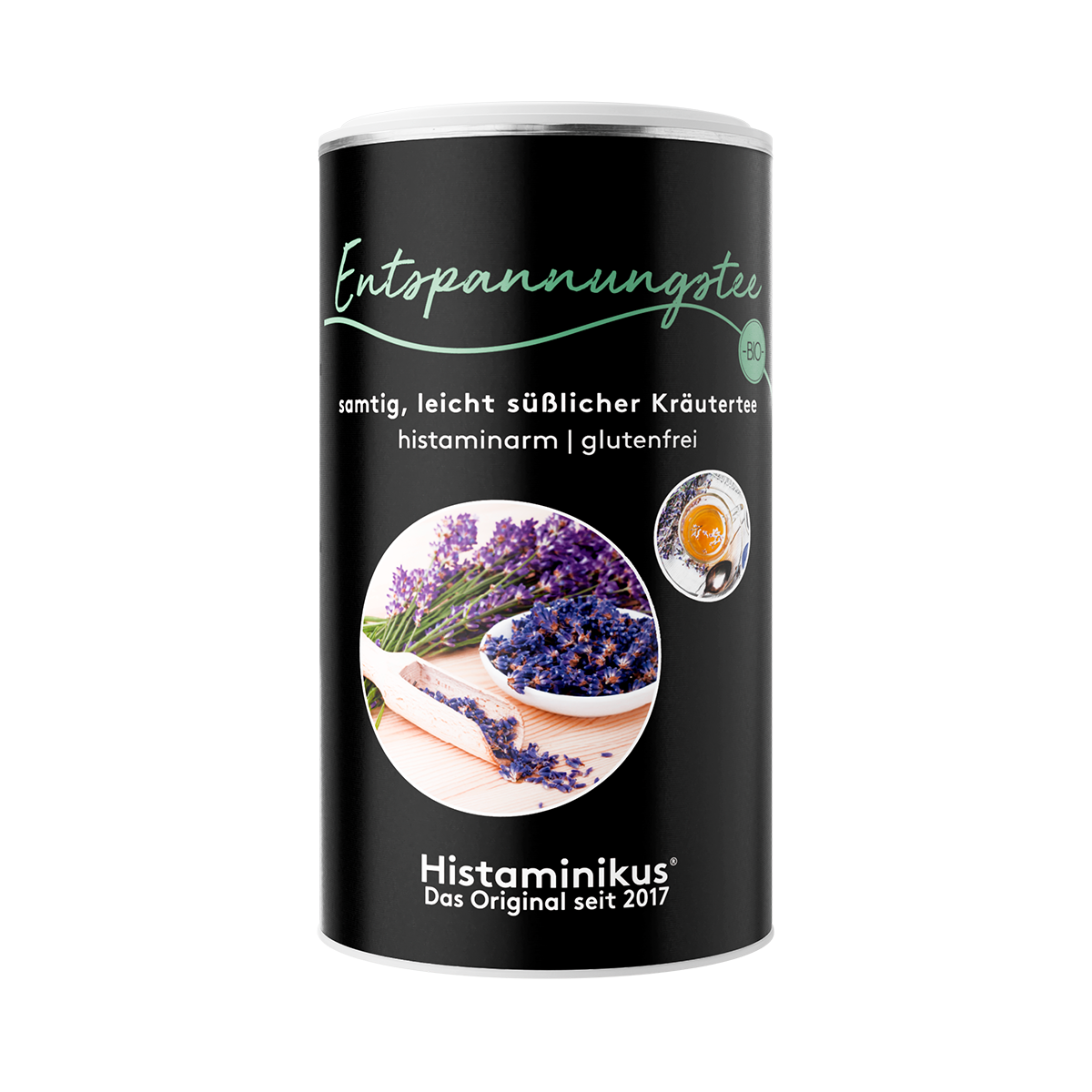
Histaminikus
Relaxation tea organic
4.76 / 5.0
(17) 17 total reviews
Share
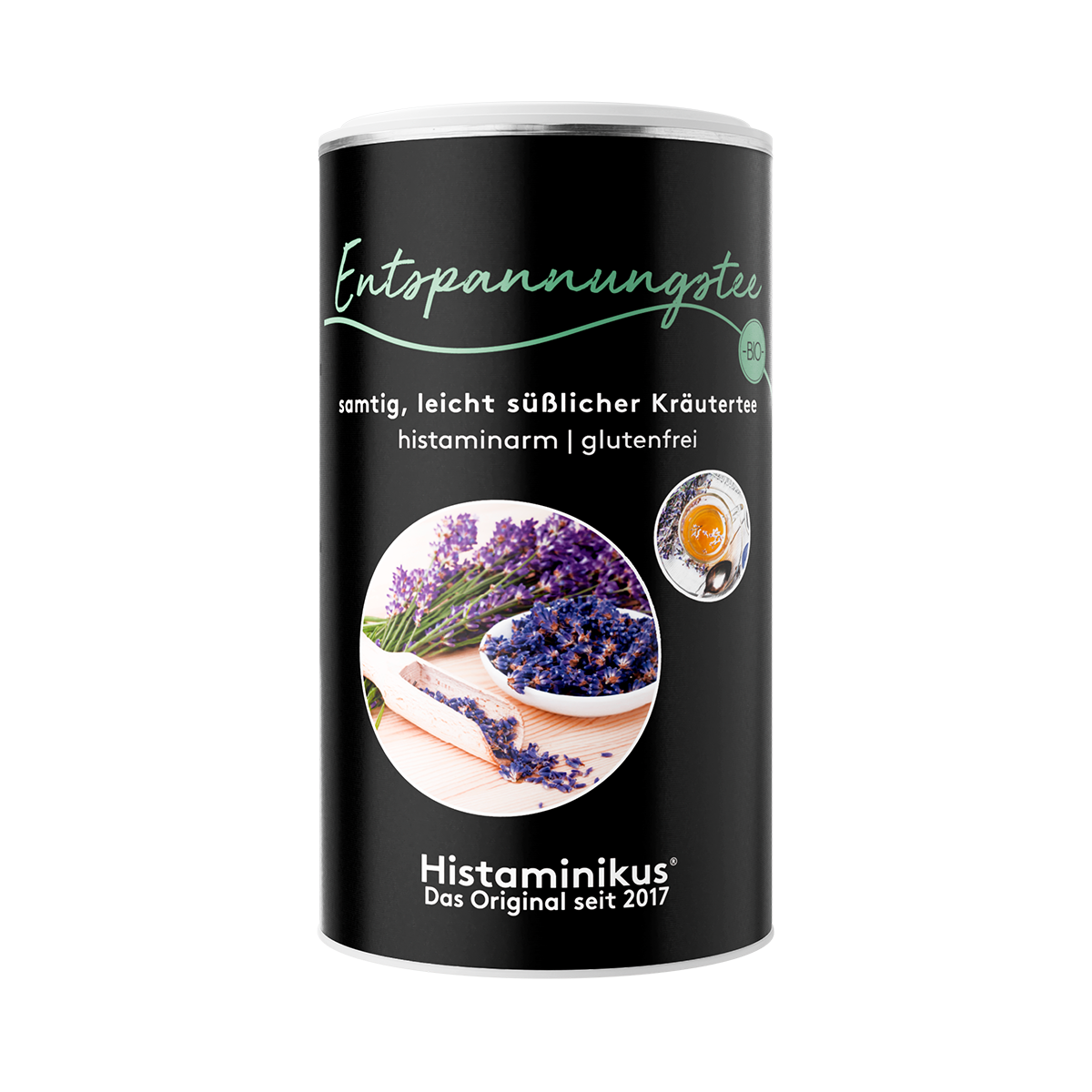
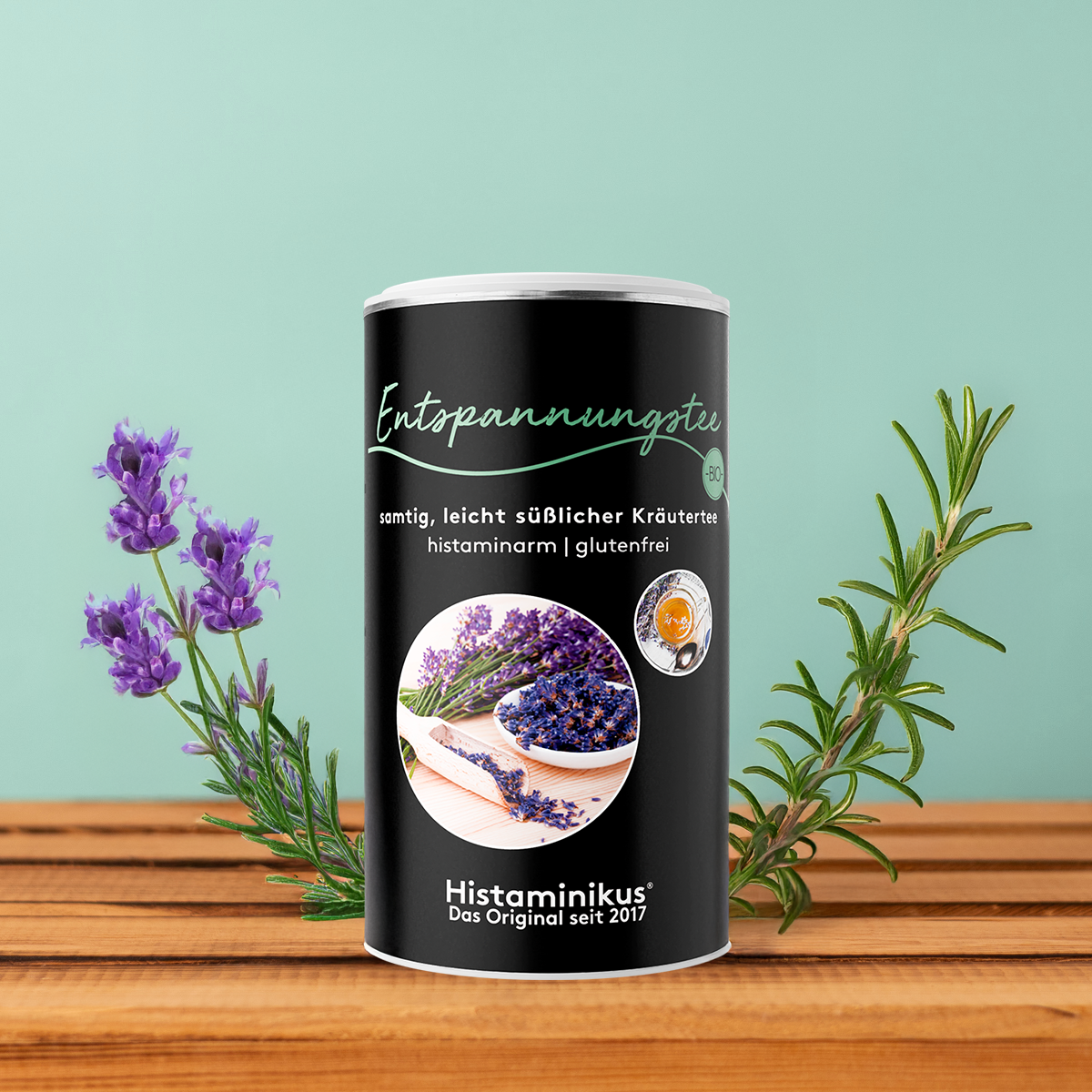
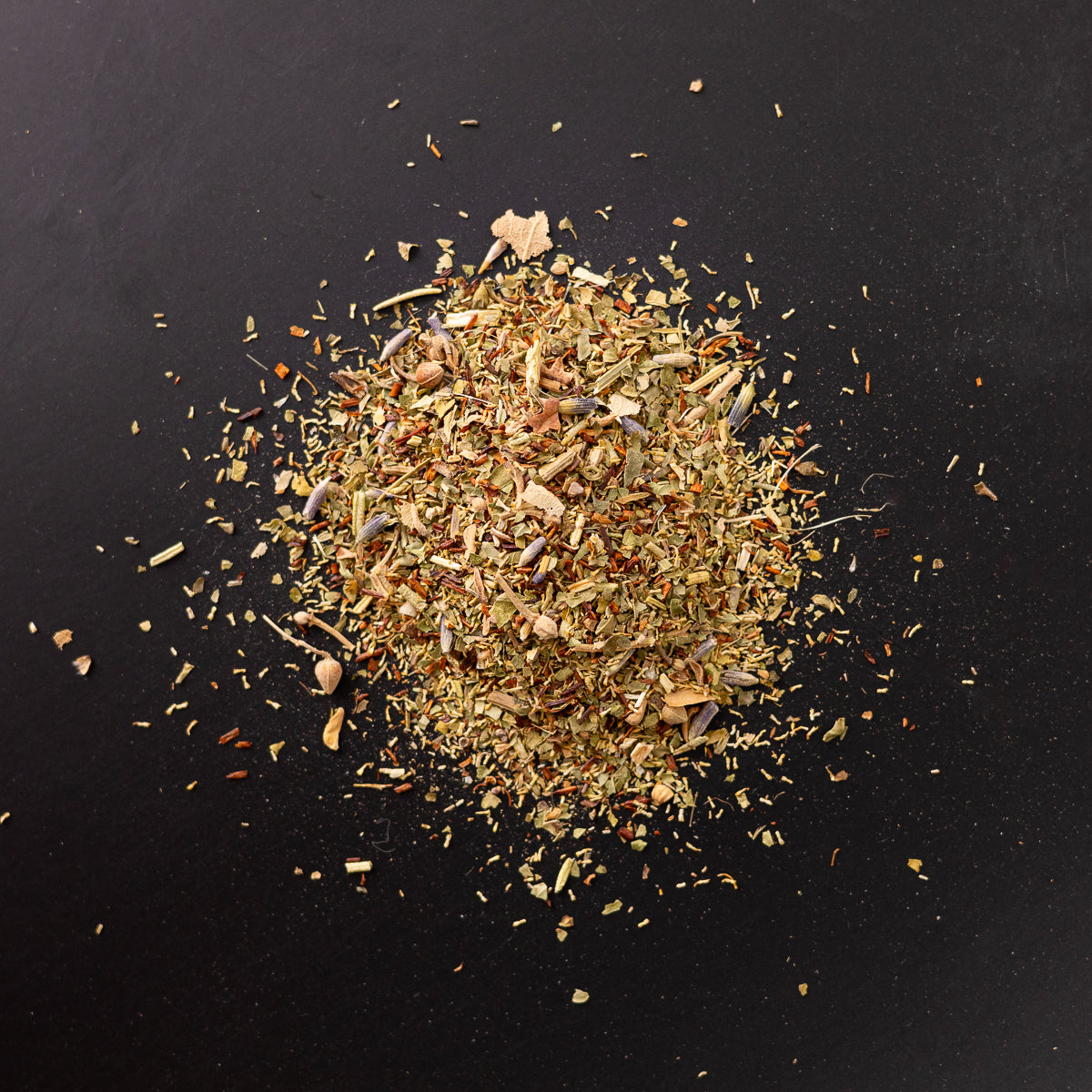
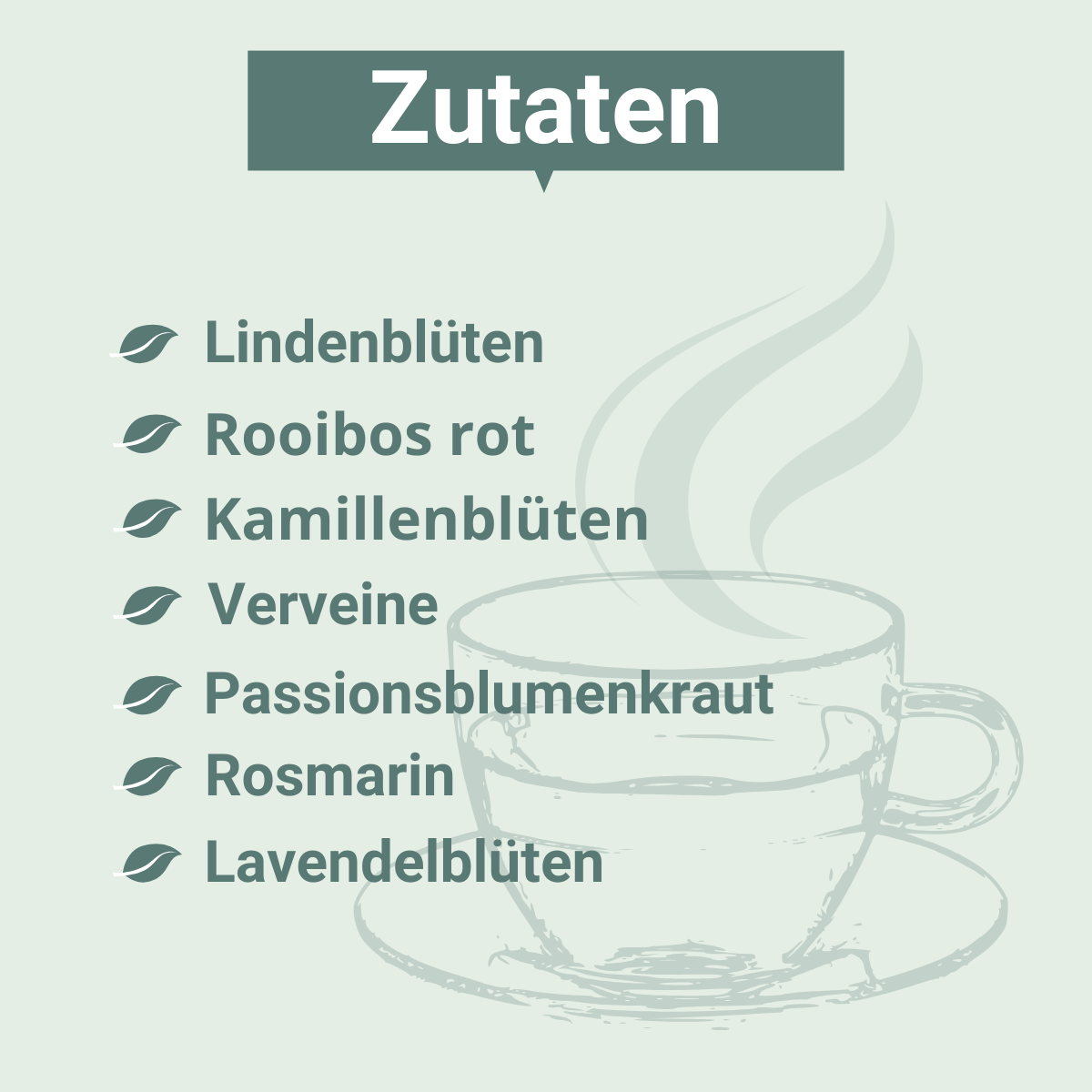

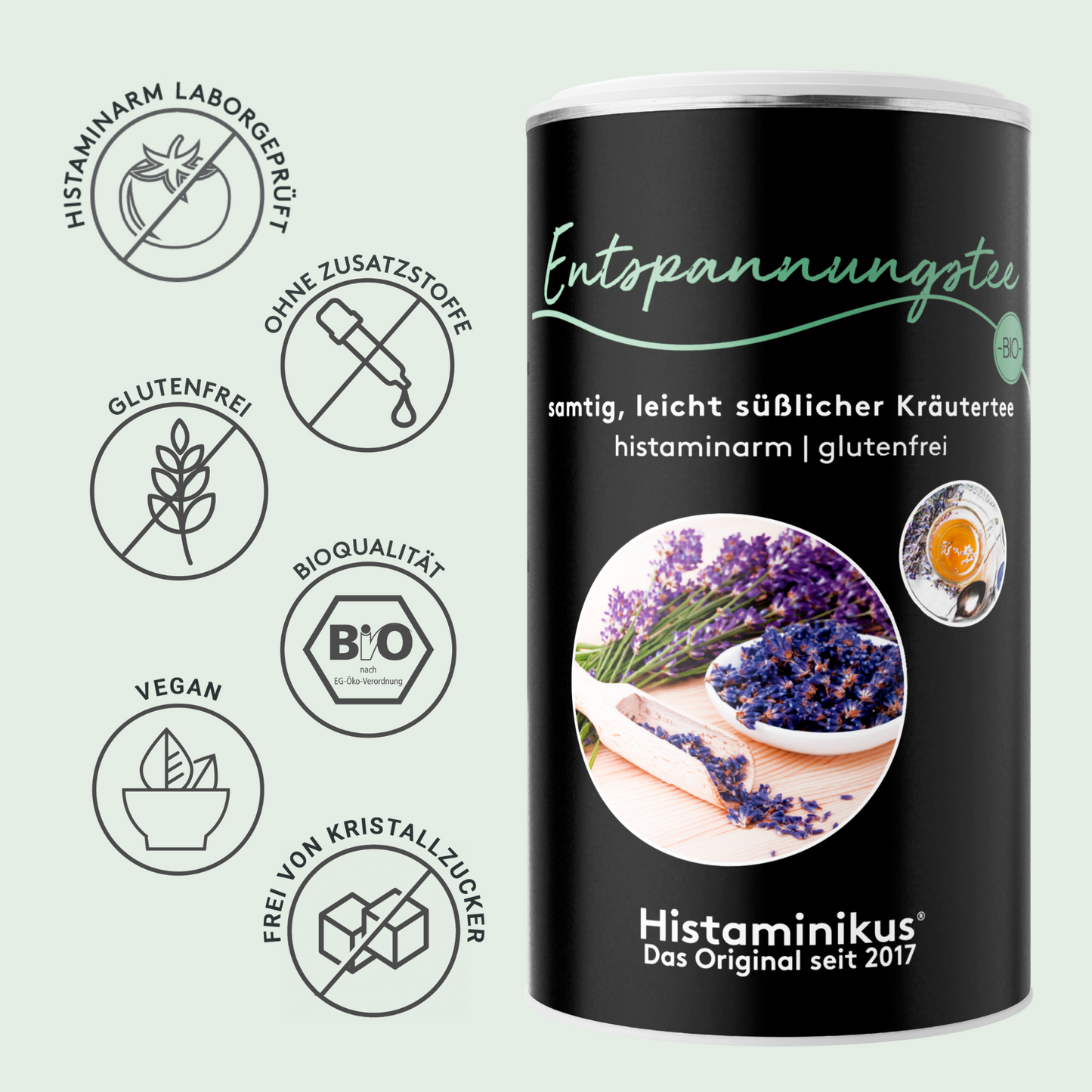

Collapsible content

From those affected for those affected
We are Thomas and Michaela Zinser, founder of Histaminikus.
Because of the own histamine intolerance of Michaela and our son, we founded Histaminikus. The frustration does not find any suitable histamine food has spurred us to develop low -histamine food.
We would like to give you back a piece of quality of life. Feel free to look around with us.
Kind regards
Thomas and Michaela






